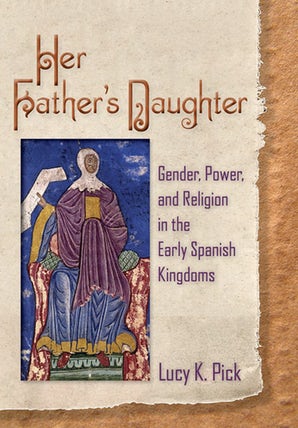In Her Father’s Daughter: Gender and Power in the Early Spanish Kingdoms, Lucy K. Pick considers a group of royal women in the early medieval kingdoms of the Asturias and of León-Castilla; their lives say a great deal about structures of power and the roles of gender and religion within the early Iberian kingdoms. Pick examines these women, all daughters of kings, as members of networks of power that work variously in parallel, in concert, and in resistance to some forms of male power, and contends that only by mapping these networks do we gain a full understanding of the nature of monarchical power.
Pick’s focus on the roles, possibilities, and limitations faced by these royal women forces us to reevaluate medieval gender norms and their relationship to power and to rethink the power structures of the era. Well illustrated with images of significant objects, Her Father’s Daughter is marked by Pick’s wide-ranging interdisciplinary approach, which encompasses liturgy, art, manuscripts, architecture, documentary texts, historical narratives, saints’ lives, theological treatises, and epigraphy
“In this meticulously researched and carefully argued study, Pick (history of Christianity, Chicago) examines the royal women of the early medieval kingdoms of Léon and Castilla to understand the structures of Iberian monarchical power…. She challenges accepted ideas of sacred kingship, showing how royal women engaged the sacred sphere through their gifts, associations, and actions, thereby gaining power that supported monarchical authority.” –Choice
“Pick’s book is well argued and strongly supported. It possesses a richness of detail, sound research, and a complexity of thought that will indeed help us to understand better the dynamics of early Spain, especially the importance of royal women in the emerging Spanish culture.”La Corónica“The best history monographs deliver much more than is expected from their main subject matter. Lucy Pick’s new study is such a book. The opening pages promise a history of royal women in the early medieval Iberian kingdoms of Asturias and León-Castilla. But it does not take long for the reader to realize that Pick has written one of the best studies of medieval political power to appear in recent years.” –The Historian
“This is an excellent book, richly deserving of a large and appreciative audience. Pick displays magisterial command of a truly impressive range of evidence (diplomatic, narrative, codicological, hagiographic, and material). The author moves nimbly between the granular analysis of particular pieces of evidence and broader depictions of the networks of kinship, patronage, and power.” –Royal Studies Journal
“Lucy Pick writes extremely well about religious language and her work on books, prayers and liturgy is illuminating.” –Journal of Ecclesiastical History
“Fully into her stride, Pick shows how gender, power, and religion interacted and overlapped, tracking the trend for royal women to become consecrated virgins rather than marriage partners… like Pick’s farsightedness, her themes and their impact will be ongoing.” –Europe: Ancient and Medieval
“Though Pick’s book is not the first study of the powerful royal women of medieval Iberia and the development of the infantazgo, it provides an insightful, longitudinal look at the subject from the Visigothic age to the beginning of the twelfth century, and briefly beyond.” –SPECULUM
“Her Father’s Daughter will contribute to and enrich ongoing discussions regarding the role and evolution of the medieval monarchy.””Nuria Silleras-Fernandez, author of Chariots of Ladies
“In Her Father’s Daughter, Lucy K. Pick looks to a much-neglected aspect of the history of the Spanish kingdoms in the eleventh and twelfth centuries. Her book is novel and original.” -Teofilo Ruiz, author of A King Travels

